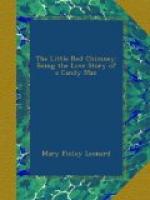It was in one of these that the Reporter had presented himself this time, and when he was gone the Candy Man returned to his gloom. Having nothing else to do just then he opened the shabby book with the funny name, and looked at the crimson flower. Through the stain of the flower he read:
"If a person is fearful
and abject, what else is necessary but
to apply for permission to
bury him as if he were dead."
The book had come into his possession by a curious chance not long before, and he treasured it, not so much for its sturdy philosophy, as because it was in some sort a link to the shadowy past of his early childhood.
The adjectives “fearful” and “abject” brought him up short. What manner of man was he to be so quickly overwhelmed by difficulties? As for being a Candy Man, did he not owe to this despised position his good fortune in meeting Miss Bentley at all?
Somewhere about eight o’clock the next evening, being Sunday, he might have been seen strolling by the house of the Little Red Chimney. That particular architectural feature had lost its identity in the shades of evening, but he was indulging the characteristic desire of a lover to gaze at his lady’s window under the kindly cover of the night.
The blind was drawn within a few inches of the sill, but these inches allowed him a glimpse of a blazing fire, and while he lingered a shadow flitted across the curtain in its direction, and then another, until in his mind’s eye he beheld Margaret Elizabeth and Uncle Bob seated beside the hearth. For aught he knew, it might be Augustus McAllister making an evening call, but the Candy Man was just then too determinedly optimistic to harbour such an idea.
[Illustration: THE MISER]
As he passed on he was occupied in trying to picture to himself her ladyship sitting before her fire, but that familiar little grey hat, which was so entirely inappropriate, would persist, in spite of all he could do, in getting into the picture. Only once, when curling plumes took its place, had he seen her without it, and though for an instant he would succeed in removing it, presto! before he knew it, there it was again, jammed down anyhow on her bright hair.
With odds in favour of the hat, the struggle came to a sudden pause at sight of a tall figure leaning heavily and in evident pain against one of the ornamental iron fences which prevailed along this street. At once proffering his assistance, he recognised Mr. Knight, the Miser.
It was plain the sufferer would have preferred to decline help. It would soon pass. It was nothing. He had had such attacks before. He spoke brokenly, adding, “I thank you,” in a tone of dismissal.
The Candy Man showed himself to be, when occasion demanded, a masterful person. Without arguing the point, he supported the Miser with a firm arm and began to urge him in the direction of his home. Mr. Knight, half fainting as he was, submitted without a word until his door was reached; then, there being no response to his companion’s vigorous ring, he murmured something about the servants having gone, and began to fumble in his pocket.




